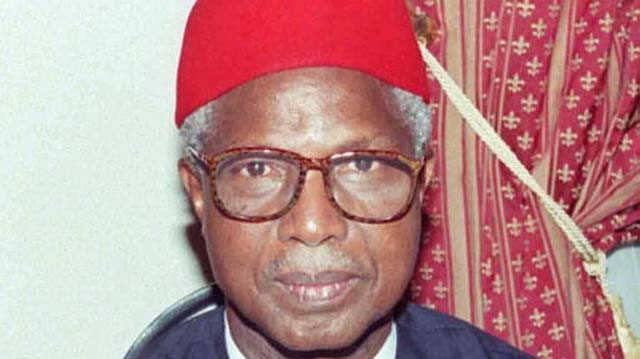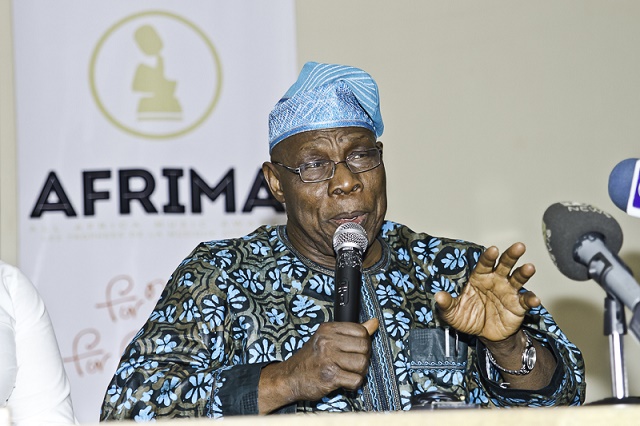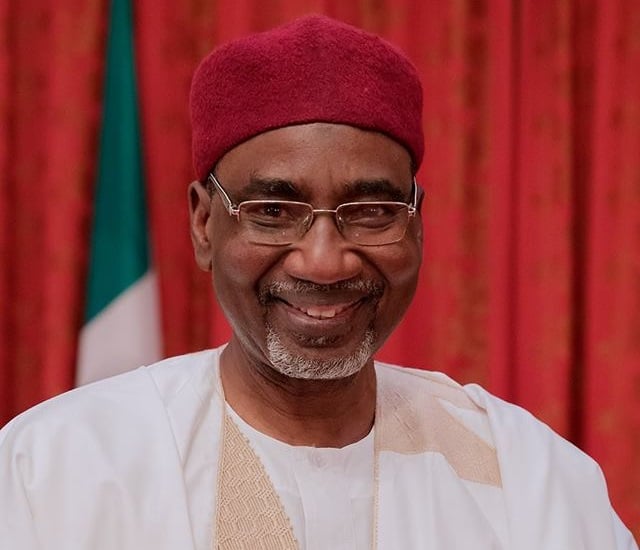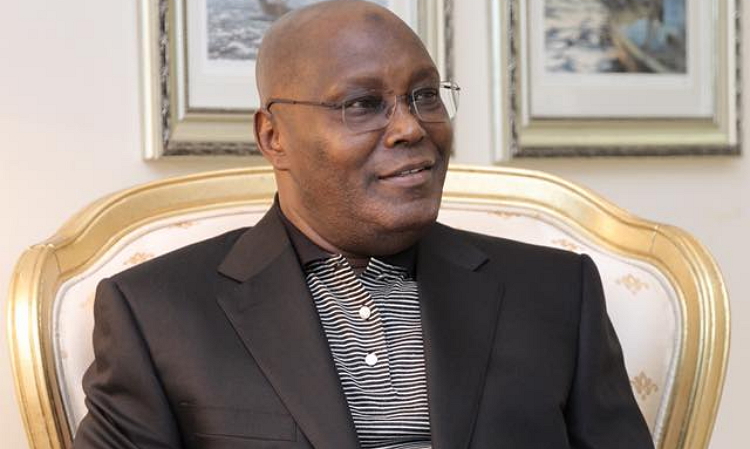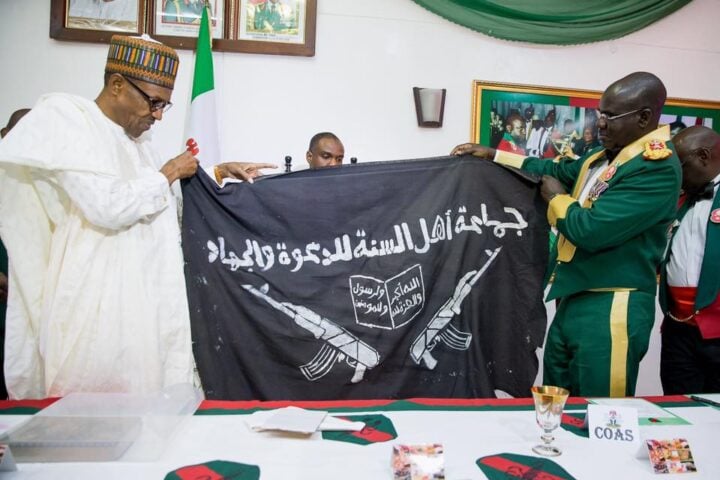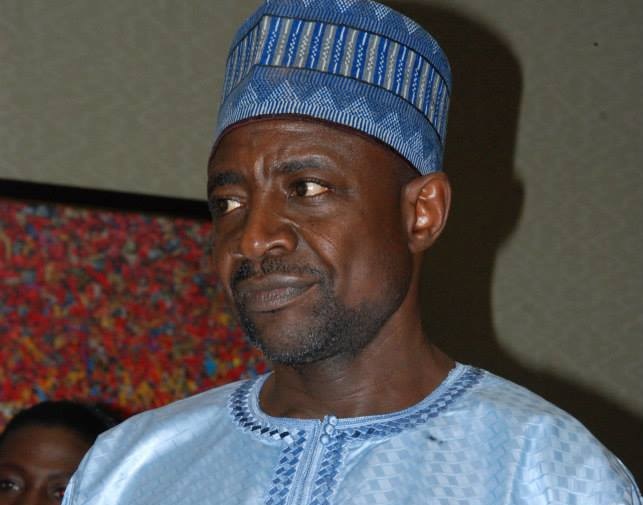BY FRANCIS ANEKWE OBORJI
Dr. Alex Ekwueme, Nigeria’s second republic first democratic elected Vice President had been receiving inspiring tributes and testimonies from different people, both far and wide, since his demise few weeks ago in a London hospital. Even at his burial ceremonies this week, many of such tributes are still pouring in. Thus, it may be superfluous to add yet another of such tributes from an insignificant person like this
writer.
However, this is actually, what I intend to do in the present article. First of all, with the present article, I want to console Ekwueme’s immediate family for the irreparable loss, and join millions of their well-wishers in honoring this great man. This is because there is an aspect of late Ekwueme’s life witness as a Christian and model
politician in Nigeria’s troubled political landscape and history, that I feel is not yet highlighted by any of the tributes I have so far read about him.
In this article, I want to appreciate Dr. Alex Ekwueme’s Christian ecumenical spirituality. It is about his love for the Blessed Virgin Mary, Mother of Jesus Christ: how Ekwueme, a very devout Anglican, became an ardent devotee of the Catholic Marian spirituality of the Holy Rosary. This great icon, Dr. Alex Ekwueme, as narrated by those very close to him, never missed reciting the Holy Rosary from the time he embraced it in 1985. This, we were told started right from the time he was unjustly incarcerated and imprisoned at the Kirikiri Maximum Prison by the Buhari/Idiagbo military junta (1983-1985).
Advertisement
I have never met Dr. Alex Ekwueme personally in life, though two of us are from the same Anambra state. He was an Anglican. I am a Catholic. I was still doing my graduate studies in philosophy and theology in the
major seminary when he was the Vice President of Nigeria. That means our age-gap is mountain apart.
However, I got to know of Ekwueme’s Marian spirituality in 1986, through a story recounted to us in the major seminary by a colleague of his, former Director of the defunct Ajaokuta Steel Industry, Engineer (Dr.) Fidelis Ezemenari. Dr. Ezemenari was an ex-seminarian and a grand Knight in the Catholic Church. He visited us at the Bigard Memorial Seminary Enugu immediately after their release from the Kirikiri Maximum Prison Lagos during Ibrahim Babaginda regime, who ousted Buhari/Idiagbo military junta in 1985.
Ekwueme was the Vice President in the second republic, and served under President Shehu Shagari (1979-1983). This first democratic elected government in Nigeria since after the Civil War, was toppled through a
military coup of the Buhari/Idiagbo military junta. Ekwueme, together with some other prominent politicians (mainly from the southern zones of Nigeria), were court-marshalled in a military tribunal on presumptuous
corruption charges. They were sentenced to many years of imprisonment by the Buhari/Idiagbon military junta. Ekwueme with a good number of others, were kept in the Kirikiri Maximum Prison, Lagos until Babaginda
military coup that toppled Buhari/Idiagbon junta came on board and freed them.
Advertisement
Among those staying in the Kirikiri prison with Ekwueme, were Chief Chukwuemeka Odimmegwu Ojukwu, Ikemba of Nnewi, Sam Mbakwe, former governor of Old Imo State, Dr. Fidelis Ezemenari, former Director General of the defunct Ajaokuta Steel Industry, and many other prominent politicians (Christians and Muslims) that had served in the second republic during Shagari/Ekwueme regime.
It was after their release from the Kirikiri prison that Dr. Ezemenari visited us at the Bigrad Memorial Seminary, Enugu. As ex-alumnus of the seminary, our rector, Rev. Fr. P.D. Akpununo had no problem, in inviting him to speak to us seminarians in a conference.
During the conference, Dr. Ezemenari narrated to us some of their ordeals, but especially, daily prayer program in the Kirikiri prison. Very touching was his narrative of their daily commitment and pledge, which each one of them (Catholics and Protestants alike), made to recite the Rosary several times each day during their private time, that is, after their group prayer meetings, morning and evening. We heard how Dr. Alex Ekwueme would stay back after the general group Christian prayer meeting to recite the Rosary together with Catholics at the Kirikiri prison. With time, however, other Protestants began to join him in reciting the Rosary together with Catholics after their general prayer meeting each day.
Dr. Ezemenari narrated to us that when they were at the Kirikiri prison, every evening, he and his group – the incarcerated politicians (Catholics and Protestants) would gather for common prayer after super. Their Muslim colleagues would do the same. At the end of the group prayer meeting, Catholics would remain behind to recite the Rosary together. Thereafter, each one of them (Catholics) would make a personal pledge to recite several decades of the Rosary, as many as possible at their private time during the day before their next prayer meeting.
Advertisement
Dr. Alex Ekwueme from the onset joined his Catholic colleagues in reciting the Rosary all the days they were at the Kirikiri prison. Although, he was an Anglican. Some would pledge 20, others 30, and still some others 50, or more decades of the Rosary to recite each day. Again, they pledged to say all these decades of the Rosary at their private time each day, before their next prayer meeting.
We were told how some personalities like Ikemba of Nnewi, Odimmegwu Ojukwu (himself a Catholic), would pledge to recite decades of the Rosary several times as much as possible each day. With time, however,
some of their Protestant colleagues, following Ekwueme’s example, began to join the Catholics in reciting the Rosary after the group common prayer meetings. They also pledged to say as many decades of the Rosary as possible at their private time each day.
In the prison, they formed a prayer-group, a kind of ‘Holy Rosary Crusaders’ for their liberation. Dr. Ezemenari took it as a duty himself to provide chaplets (Rosary beads) to his other colleagues, especially, the Protestants who were not used to this Catholic tradition. As he narrated to us, the greatest thing his wife would bring him each time she visited, were chaplets. Most of the time, the chaplets wouldn’t be enough to reach the number of the prison inmates requesting for it. In this case, his wife would return the next day with some more chaplets for the incarcerated politicians.
Ezemnari’s job, as he told us, was to distribute the chaplets to his colleagues and search out those who had not yet joined them to come and do so. He would move from one prison cell (room) of his colleagues to the other, mainly Catholics and Protestants, persuading them to make some pledge to say the Rosary at their private time for their quick release from prison. He would write down in a piece of paper the number of decades of the Rosary each of them had pledged to recite for the day.
Advertisement
One of the most entertaining part of the conference was when he told us about his encounter with Governor Sam Mbakwe. He had gone to Mbakwe to request him to make some pledge on the number of decades of the Rosary to say that particular day. Of course, he had been meeting him for the same purpose in the past, but proved very difficult to convince, since Mbakwe was a very devout Protestant like Ekwueme.
This particular day, however, he went to him, and in an undiluted Owerri Igbo dialect, Mbakwe said to him, “BIA NWOKE M, I SHI N’OBU N’OKPORO NWANYI K’ANYI GA EJI NWETE NZOPUTA? … NGWA, DETUOLA M
50!” (Literally: Look here Mr. Man, are you saying that it is under a woman, we shall be liberated? Well, write down here for me, 50 decades of the Rosary_). We spent almost about five minutes laughing as Dr.
Ezemenari narrated this part of the story to us that day.
Advertisement
Thus, the politicians – Catholics and Protestants began to commit themselves individually, to reciting decades of the Rosary in private every day, throughout the period they stayed at the Kirikiri prison. According to Dr. Ezemenari, long after their release from prison, he was with Ekwueme in a public function, and found him with Rosary. The wife told him that, “he (Ekwueme) still says his Rosary every day.”
Like Ekwueme and Ezemenari, most of these politicians still believed, it was their prayer life, especially, daily recitation of the Holy Rosary that helped to keep them going throughout the period of their incarceration at the Kirikiri prison. They attributed their liberation and coming out from the prison in good health, as result of the powerful intercession of the Blessed Virgin Mary, whom they fled to her heavenly maternal protection and patronage through the Rosary in the prison yard.
Advertisement
Through their commitment in the recitation of the Holy Rosary, their spirit, both as individuals and group, were kept high, and the hope of liberation never departed from them. They were always in high spirit throughout the period of their incarceration, with hope that whatever happens, their liberation was imminent. They still strongly believed that their liberation and release from the prison was as result of their countless recitation of the Holy Rosary during that period of their incarceration.
THE HOLY ROSARY: A HISTORICAL BACKGROUND
Advertisement
The Holy Rosary is devotional prayer honoring the Blessed Virgin Mary. It is usually, recited on a string of beads, which is divided into five sets, known as decades, with ten smaller beads and one large bead. On
each smaller bead is recited a Hail Mary and on the larger bead is said the Our Father (PATER NOSTER). Each decade is preceded by an Our Father and a Glory Be.
It is a devotion to the fifteen mysteries, with the recitation of the fifteen decades. On most occasions, one-third (or five decades) is said at one time. The mysteries are divided into three groups, the Joyful, Sorrowful, and Glorious Mysterious. Before his death, Pope St. John Paul II added the Mystery of Light, making it four.
According to tradition, the Rosary was first made popular by St. Dominic (1170-1221), who sought the aid of Our Lady during travails and bloodshed of the Albigensin Crusade in southern France. As reported in
the stories told in honor of the Feast of the Holy Rosary (October 7), Dominic was commanded to preach the Rosary among the heretics. The saint was thereafter its most ardent promoter, his special status noted by several popes, including Leo XIII who, in an encyclical, Laetitae sanctae (“Commending the Devotion to the Rosary”), on September 8, 1893, recognized as historical fact Dominic’s role in establishing the Rosary.
This extra-liturgical Marian devotion finds its chief liturgical source in the psalter of the Old Testament book of 150 psalms as distributed in the Liturgy of the Hours or Divine Office (Breviary). In an effort to make the spiritual riches of the liturgy accessible to all the faithful, a “psalter of the laity” emerged during the early Middle Ages. The Irish monks, who divided the psalter into three sets of fifty psalms each, brought this custom to the European continent in their missionary efforts. Lay brothers in the monasteries were required to say fiftypsalms or fifty Our Fathers for a deceased monk, and this practice of substituting the Lord’s Prayer for a psalm spread among the laity. To count these prayers strings of beads were used, the origin of Rosary beads.
DEVOTION TO MARY FOLLOWED A SIMILAR PATTERN. A psalter of 150 Hail Marys began to take shape. Towards the end of the twelfth century this prayer (i.e., the first part of what we call today – the greetings of the
angel at the annunciation and of Elizabeth at the Visitation (Luke 1:26-45), came to be one of the prayers that all the faithful should know and understand along with the Our Father and the Creed. Meditation upon the mysteries developed by the addition to each psalm of a phrase referring to Jesus and Mary. Eventually, the psalms were omitted, and the phrases became brief lives of the Son and his mother from the annunciation to their glorification. The Rosary therefore, is prayer mediation on the mystery of our redemption in Jesus Christ.
Between 1410 and 1439 Dominic of Prussia, a Carthusian (inspired by his patron saint, St. Dominic), helped to make the practice popular by joining fifty Hail Marys with Fifty such phrases. The name “rosary” thus began since a ROSARIUM (a rose garden) was used to designate this collection of fifty points of meditation. The rose, a symbol of joy, was fittingly applied to Mary, “cause of our joy” in bringing us Christ. Another Carthusian, Henry Kalkar, divided the Hail Marys into decades with Our Father between each decade.
Although the essential elements of the Rosary were in place by the first part of the fifteenth century, it had to be simplified before it became a truly popular prayer form. In 1483, OUR DEAR LADY’S PSALTER, a book on the Rosary by a Dominican, mentions fifteen mysteries, the same as today (before the addition of the mystery of Light in recent times), except that the fourteenth (fourth glorious) combined the coronation with assumption of the Blessed Virgin Mary in Heaven, and the fifteen was the last judgement. In 1470, Blessed Alan de la Roche, a Dominican, founded the Confraternity of the Psalter of Jesus and Mary, forerunner of the Rosary Confraternity through which it became a devotion of the
universal church.
Pope St. Pius V’s Bull of 1569, Consueverunt Romani Pontifices (frequently referred to as the magna carta of the Rosary), established it in the church only after many centuries of significant development of the devotion. He completed it as a close connection of mental and vocal prayer, made its meditative aspect a necessary condition for gaining favors attached to the devotion.
In Maralis Cultus, an apostolic exhortation issued in 1974 for the right ordering and development of Marian devotion, Pope Paul VI emphasizes the contemplative aspect of the Rosary. He calls it the “soul of the devotion, but also refers to the recitation of the vocal prayers as being helpful to meditation upon the mysteries when the Rosary is recited with a “quiet rhythm and a lingering pace.” The Pope also reflects upon the effectiveness of this private devotion both as a preparation for the celebration of the same mysteries of our redemption in the Eucharistic liturgy and as a continuation of its special graces in our lives. Thus he proposes profound harmony between the Rosary and the liturgy when it is contemplatively recited outside celebration.
THE IMPORTANCE OF THE ROSARY IN MOMENT OF TRAVAILS
One of the things we are yet to discover and appreciate in Nigeria’s political metamorphosis, is the power of the Holy Rosary in the life of a nation as well as individuals, especially, in times of crisis and fight against injustice. The Holy Rosary prayer is a popular Catholic devotion respected worldwide by Catholics and non-Catholics alike. This is in spite of what one may like to hold about the Catholic devotion and reverence to the Blessed Virgin Mary, Mother of Jesus Christ.
The devotion to the Blessed Virgin Mary through the recitation of the Holy Rosary developed in some countries and places, principally, as result of witnesses and personal spiritual experiences of individuals and nations that obtained special favors from God through the intercession of the Blessed Virgin Mary by simply reciting the Rosary.
At independence in 1960, Catholic Bishops’ Conference of Nigeria (CBCN) dedicated Nigeria to the special protection of the Blessed Virgin Mary, and proclaimed her, the Patroness and Queen of Nigeria.
Every year, during independence anniversary on October 1, the Catholic Church in Nigeria celebrates the solemnity of Mary, Patroness and Queen of Nigeria. Thus, while the universal church celebrates the feast of St.
Theresa on October 1, in Nigeria, we celebrate the Solemnity of Our Lady, Queen of Nigeria. Nigeria celebrates the feast of St. Theresa on October 3.
Suffice is to add that after the Civil War in 1970, one of the prayer devotions the church, especially, in Eastern Nigeria sought to rehabilitate the people both spiritually and psychological was the Rosary devotion. This gave rise to the emergence of the famous Block Rosary Crusade Centers all over the villages and towns in Igboland and elsewhere. Thus, when the Federal Military Government and the defunct East Central State Government of Ukpabi Asika confiscated church owned schools and expelled all the foreign missionaries in the former Biafra
enclave, the church responded by appealing to the Marian devotion of Our Lady of Fatima.
The Block Rosary Crusade Marian devotion of children in Eastern Nigeria developed along this line. This Marian devotion of children helped to rehabilitate the people, especially, the young spiritually, psychologically and socially from the trauma after the horrors of the Nigeria-Biafra War (1967-1970). The Block Rosary Crusade Centers became places of sharing and prayer for community and personal development and growth of our children and young people – encouragement of one another both in matters of faith and socio-economic well-being of individuals and families. They became also centers for catechism and instruction on basic teachings of our Christian faith to the young people.
Most of Igbo young men and women adult we see today, especially, Catholics were products of the Block Rosary Crusade prayer centers. This was one of the silent ways, the church contributed in rehabilitating the people in Eastern Nigeria after the civil war in 1970. With time, however, the Anglican Church in some parts of Eastern Nigeria started to organize a similar prayer crusade for their young people, though without the figure of the Blessed Virgin Mary.
However, the good news, is that today, the Block Rosary Crusade children’s prayer centers have spread to other parts of Nigeria. It is now a common heritage of the Church in Nigeria.
This is just an example of how much Nigerians could discover and benefit from Marian devotion for our individual spiritual growth and national development.
Down the ages, history tells us that individuals and nations had sought the intercession of the Blessed Mary in some great moments of travails and hopelessness. She never disappointed any individual or people who sought her aid in such moments of travail.
We learnt in school about the Battle of Lepanto. This important naval engagement was fought on October 7, 1571, between the Othman Turks and a fleet of the allied Christian forces. After the Turks had taken over the imperial city of Constantinople (the present Istanbul), they marched into Mediterranean peninsula towards Venice, with the hope to reach Rome, sack the Pope and take over the Western Mediterranean crescent. This was what they had done to both the Eastern Church Patriarchate of Constantinople and the last Emperor of that city.
In fact, the Turks had been increasingly a danger to Christendom in the Mediterranean in the years just prior, especially launching campaigns against Venice with the aim of driving the Venetians from the area of the eastern Mediterranean. The Venetians responded by appealing to the Pope for moral leadership and spiritual support.
In return, however, the pope requested Christians to seek the intercession of the Blessed Virgin Mary so that the Christian allied forces (Venetians and Spaniards) would prevail over the Turks. Thus, in the combat against the Turks under Ali Pasha (also spelled Pasa) in the Gulf of Patras, near Lepanto (Naupaktos), after hours of bitter fighting, the Christian allied forces defeated the Turks, and had about ten thousand Christian galley slaves freed. In celebration and thanksgiving, Pope Pius V instituted a special feast of the Virgin Mary. From 1573, October 7, the church has been kept October 7, as the Feast of the Rosary. G.K. Chesterton (1874-1936) authored a well-known poem on Lepanto.
Pope St. John Paul II attributed his survival from the assassination attempt on his life by a Turkish Arab terrorist at the Vatican Square in the early1980s, to the miraculous intervention of the Blessed Virgin Mary. The fall of the Berlin Wall and communism in 1989, are also attributed to the special intervention of Blessed Mary. It was a fruit of Marian devotion of Christians to Our Lady of Fatima in Portugal.
There are hundreds of such examples of nations and individuals who fled to the patronage and maternal protection of Blessed Virgin Mary in moments of travail. What lesson does this teach us in Nigeria today?
At this most critical moment of Nigeria’s checked history, when the lives of ordinary citizens have no value again, the church must not lose sight of this aspect of Marian devotion and spirituality in the country.
We need to invoke the Blessed Virgin Mary, the Queen of Nigeria in a very special way at this most critical period of our history as a nation and church.
CONCLUSION
This is the legacy of late Dr. Alex Ekwueme. In moment of travails, Ekwueme discovered Blessed Virgin Mary, Mother of Jesus Christ. Since then, he never left her until his demise some weeks ago.
Since our political independence, Nigeria, through the Catholic Bishops’ Conference discovered the spiritual powerful intercession of Blessed Virgin Mary. Mary is honored in Nigeria as Patroness and Queen of the nation. In this most critical moment of our history as a nation, we may be certain she will NOT disappoint us if we invoke her to come to our aid.
Accept or reject it, the fact is that the church through her moral and spiritual leadership in the past was able to save Nigeria from total collapse. Today the country is crying out for redemption in a way never experienced before. The Church in Nigeria today must rise up to its responsibility. Our predecessors in the church in the past were able to rise to the demand and challenges of their time for the nation.
The current leadership failure in Nigeria’s political landscape has introduced an era of impunity and recklessness where human life has lost its value. Because of failure of political leadership in the present dispensation, our sense of humanity has been reduced to its lowest ebb. Those at the corridors of power in the country have not shown any sign of being capable of addressing to this ugly situation.
Today in Nigeria, there is an increasingly lost sense of the value of human life – dignity of the human person, rule of law, justice and fair play. For the common people, as things are now in Nigeria, there is no credible leadership to rely upon.
The church must rise up and address this situation as it has done in the past. Our political class and military – both serving and ex-generals, should be called to order. As in the past, the church should come to the aid of ‘Nigeria in Distress’ and save it from its present slumber.
We should not continue to fold our arms and wait for an angel to come down from heaven and do the work for us. The church should not wait and watch Nigeria been taken over totally by warlords and mercenaries in the
name of ‘government of change’ or political correctness. Sadly, Nigeria is increasingly becoming a new Afghanistan in sub-Saharan Africa. We must not allow this to happen.
During the civil war (1967-1970), the Church in Eastern Nigeria provided succor to the Biafran victims of the war. Through the invention of the church, especially, Pope Paul VI and the World Council of Churches, a
peaceful cease-fire of ‘no-victor no vanquished’ was negotiated between Nigeria and Biafra. This helped to bring the civil war to an end in 1970.
Moreover, in the late 1990s, the church responded prophetically through prayer crusade to end the Abacha dictatorship and tyrannical regime, with the famous “PRAYER FOR NIGERIA IN DISTRESS.” The then ailing
Pope John Paul II was invited by the Catholic Bishops of Nigeria to visit the country and he obliged them. During his visit in March 1998, he beatified the first Nigerian Blessed, Father Michael Cyprian Iwene
Tansi of Aguleri. This was at that most critical moment of our national history under Abacha dictatorship.
That singular visit of Pope St. John Paul II and beatification of Blessed Iwene Tansi in 1998 in Nigeria changed everything thereafter. It gave us the new era of democratic rule that is today under serious threat. The question today is, “What is the Church in Nigeria still waiting for before intervening prophetically as it had always done in the past?”
Today, something more dangerous than the Abacha regime has descended on Nigeria. As the Popes of the past did during the Battle of Lepanto in the Middle Ages against the Turks, and towards the fall of the Berlin Walls of the Communist era in modern times, the Church in Nigeria, is today, challenged to provide the needed moral leadership and prayer crusade of Marian devotion. We did it as a church in the past in Nigeria. We can reproduce it today if we want to.
Failure to do so will be working against the church’s chosen vocation to the people of Nigeria. History will not be very kind to our generation if we fold our arms and continue to watch things drift without the ecclesial intervention.
Lord help me to remember that nothing is going to happen today that you and I together can’t handle.
Views expressed by contributors are strictly personal and not of TheCable.
Add a comment
